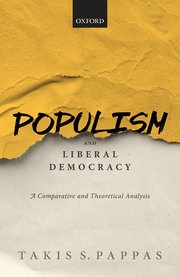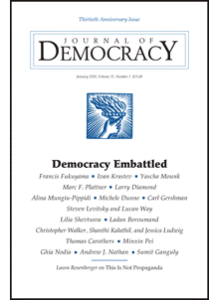 Established democracies should draw lessons from the struggles of liberals fighting the good fight in younger and less stable democracies, says Stanford University political scientist Larry Diamond.
Established democracies should draw lessons from the struggles of liberals fighting the good fight in younger and less stable democracies, says Stanford University political scientist Larry Diamond.
Defeating populism requires a clear analysis of its structure and logic. As the Greek political scientist Takis Pappas – author of Populism and Liberal Democracy – has observed in the National Endowment for Democracy’s Journal of Democracy, “Populism typically displays four interrelated—and mutually reinforcing—characteristics,” he writes for The American Interest:
- These are, first, charismatic leadership;
- second, a strategy of bitter and incessant political polarization (separating the “good,” deserving majority from the corrupt ruling elite and their decadent and undeserving supporters);
- third, efforts to take control of the state and “emasculate liberal institutions;” and ..
- fourth, “the systemic use of patronage to reward supporters and crowd out the opposition.” In addition, contemporary populism mobilizes fear and resentment against ethnic, religious, or nationality minorities, and xenophobia about foreigners and global institutions.
 Political learning must now move in the reverse direction from its normal “flow”—older, advanced democracies need to carefully study the experiences of younger and less stable ones. For it is the newer and more embattled democracies that have the greatest experience with illiberal populism, and who know its strengths and its vulnerabilities, Diamond adds. He outlines what he learned from democrats’ struggles against populism and from scholars who have analyzed their successes and failures.
Political learning must now move in the reverse direction from its normal “flow”—older, advanced democracies need to carefully study the experiences of younger and less stable ones. For it is the newer and more embattled democracies that have the greatest experience with illiberal populism, and who know its strengths and its vulnerabilities, Diamond adds. He outlines what he learned from democrats’ struggles against populism and from scholars who have analyzed their successes and failures.
- Don’t try to out-polarize the charismatic “polarizer in chief,” either in style or program. If you do, you will be playing by his logic and rhetoric, and on his psychological turf. It’s likely to be a losing game, because he is better at it than real democrats are, and because a campaign strategy centered on strident denunciation of the populist and his misdeeds will harden and mobilize his base and alienate some swing voters. Therefore:
- Pursue an inclusive electoral strategy that reaches out to doubting elements of the populist’s support base and mobilizes the broadest possible constituency for change. Don’t consign people who voted for the populist last time or who once “approved” of his performance to a “basket of deplorables.” Don’t question the morals or motives of his sympathizers, but rather appeal to their interests and positive values. And therefore:
 Avoid tit-for-tat rhetorical slugfests that mimic the populist’s penchant for name-calling and the politics of personal destruction. Don’t descend into the muck of ridicule or invective; stick to principles and behavior. You can’t one-up a populist in verbal abuse. If you try, you look smaller. You descend to his moral level, and, by implying that his supporters were morally depraved to have ever supported him, you lose the ability to pry some of them away.
Avoid tit-for-tat rhetorical slugfests that mimic the populist’s penchant for name-calling and the politics of personal destruction. Don’t descend into the muck of ridicule or invective; stick to principles and behavior. You can’t one-up a populist in verbal abuse. If you try, you look smaller. You descend to his moral level, and, by implying that his supporters were morally depraved to have ever supported him, you lose the ability to pry some of them away.- Show some humility, empathy, and even love to neutralize the populist’s poisonous politics of resentment and division. …To triumph at the ballot box, a populist must win over voters who are not racist or authoritarian but are angry and insecure. The populist connects with anxious voters on an emotional level. To connect on an emotional level with voters who are hurting, democrats do not need to exploit emotions, but they do need to understand them and show empathy for them, as the Polish scholars Jaroslaw Kuisz and Karolina Wigura argue in an incisive essay in the forthcoming (April) Journal of Democracy. What has unhinged these voters from their traditional political attachments and values? Why did they answer the siren song of illiberal populism in the last election? …. Therefore:
 Craft a positive, issues-based campaign strategy focused on the policy failings and vulnerabilities of the incumbent populist administration. Offer substantive, practical, non-ideological policy proposals that not only rally the political opposition but also induce some supporters of the populist to defect to a broad-based campaign for the future.
Craft a positive, issues-based campaign strategy focused on the policy failings and vulnerabilities of the incumbent populist administration. Offer substantive, practical, non-ideological policy proposals that not only rally the political opposition but also induce some supporters of the populist to defect to a broad-based campaign for the future.- Don’t let the populist hijack nationalism. Democracy requires “a sense of common belonging.” Offer a liberal, democratic version of unifying pride in the country as a democracy. To be effective, such a liberal nationalism has to be credible, and to be credible it has to be sincere. ….
- Offer hope and an optimistic vision of a better future. A democratic alternative does not have to be charismatic or radical to motivate people. But it does need to articulate more than a rational appeal to interests or a technocratic future of smart government. It has to offer what Richard Nixon (of all people) called, in his first State of the Union address, “the lift of a driving dream.” ….
- Don’t be boring. Kuisz and Wigura also urge liberal democrats not to ignore the stylistic element of electoral politics. Our era is saturated with constant streams of information, pulsating rapidly from multiple sources. …. Democrats don’t need to peddle in falsehood or invective to find lively and creative ways to communicate their message of hope, inspiration, and concrete policy alternatives, and to do so with passion and conviction.







